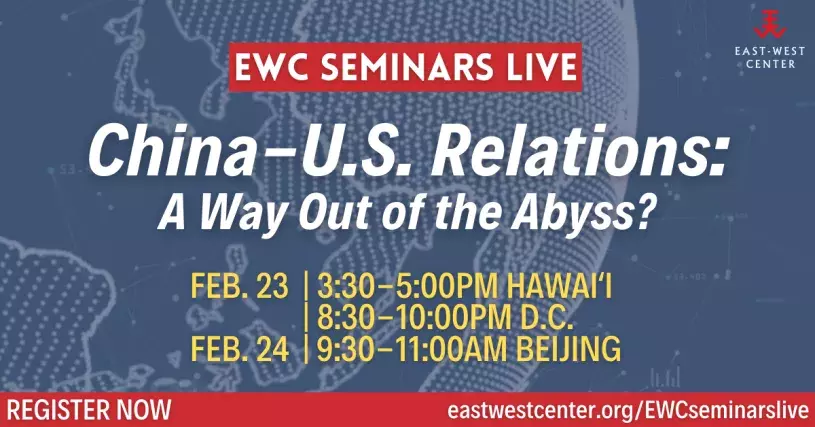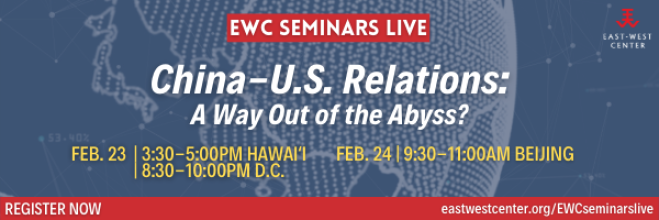Error message


China-U.S. Relations: A Way out of the Abyss?
Wednesday, February 23, 2022 | 3:30 – 5:00pm Hawaiʻi | 8:30 – 10:00pm Washington, DC
Thursday, February 24, 2022 | 9:30 – 11:00am Singapore & Beijing
REGISTER NOW!
The US-China relationship has become the world’s most important bilateral relationship, encompassing the two largest economies on earth. Their relations during the post-Mao era have fluctuated between good and poor. The relationship reached a new trough during the Trump Administration, which took office as many observers concluded that contrary to US hopes, China had become more authoritarian and aggressive as it grew wealthier and more powerful. Trump highlighted the large and chronic US trade deficit with China, while his senior officials took a tougher strategic and ideological posture toward China than previous US governments. The results were a minor “trade war,” greater emphasis on the adversarial aspects rather than the cooperative aspects of US-China relations, and movement toward economic decoupling.
Chinese officials saw a sudden US departure from the previous arrangement of “focusing on cooperation and managing differences” along with sharp new US attacks in especially sensitive areas: upgraded US-Taiwan contacts, US criticism and even sanctions over the “internal matters” of Xinjiang and Hong Kong, and outgoing US Secretary of State Mike Pompeo’s call for the overthrow of the Chinese Communist Party. At the same time, they perceived that the United States was in decline, as evidenced by the 2008 financial crisis, poor US management of the pandemic, and political turmoil within the USA. They concluded America was making a last, futile push to prevent China from ascending to regional and global leadership.
The Biden Administration took office in January 2021, offering the possibility of a fresh start. The Biden team, however, maintained a largely adversarial stance. Biden declined to remove the Trump-era tariffs. Initial high-level meetings, such as the Alaska meeting in March and Deputy Secretary of State Wendy Sherman’s visit to China in July, went badly and hardened attitudes on both sides. Two phone calls between Biden and Xi made no significant breakthrough.
An October meeting in Zurich between US national security adviser Jake Sullivan and China’s top diplomat Yang Jiechi offers new hope of a recovery in the bilateral relationship. The two held a virtual meeting last November. Did this meeting lead to improved China-US relations or a continued spiral toward confrontation?
Panelists: (listed in speaking order)
- Rick WATERS, Deputy Assistant Secretary for China, Taiwan and Mongolia, Bureau of East Asia and Pacific Affairs, US Department of State, Washington, DC, USA @USAsiaPacific
- Mingjiang LI, Associate Professor and Provost’s Chair in International Relations, Nanyang Technological University, Singapore @JackLi72342096
- Yun SUN, Senior Fellow and Co-Director, East Asia Program and Director, China Program, Stimson Center, Washington, DC, USA @Stimson_EAsia
Moderator:
Julie MCCARTHY, National Public Radio (NPR) Southeast Asia Correspondent, Manila, Philippines @JulieMcCarthyJM
Please check our webpage www.eastwestcenter.org/ewcseminarslive and follow us on Instagram @EWCSeminars for the latest updates!

China-U.S. Relations: A Way out of the Abyss?
Wednesday, February 23, 2022 | 3:30 – 5:00pm Hawaiʻi | 8:30 – 10:00pm Washington, DC
Thursday, February 24, 2022 | 9:30 – 11:00am Singapore & Beijing
REGISTER NOW!
The US-China relationship has become the world’s most important bilateral relationship, encompassing the two largest economies on earth. Their relations during the post-Mao era have fluctuated between good and poor. The relationship reached a new trough during the Trump Administration, which took office as many observers concluded that contrary to US hopes, China had become more authoritarian and aggressive as it grew wealthier and more powerful. Trump highlighted the large and chronic US trade deficit with China, while his senior officials took a tougher strategic and ideological posture toward China than previous US governments. The results were a minor “trade war,” greater emphasis on the adversarial aspects rather than the cooperative aspects of US-China relations, and movement toward economic decoupling.
Chinese officials saw a sudden US departure from the previous arrangement of “focusing on cooperation and managing differences” along with sharp new US attacks in especially sensitive areas: upgraded US-Taiwan contacts, US criticism and even sanctions over the “internal matters” of Xinjiang and Hong Kong, and outgoing US Secretary of State Mike Pompeo’s call for the overthrow of the Chinese Communist Party. At the same time, they perceived that the United States was in decline, as evidenced by the 2008 financial crisis, poor US management of the pandemic, and political turmoil within the USA. They concluded America was making a last, futile push to prevent China from ascending to regional and global leadership.
The Biden Administration took office in January 2021, offering the possibility of a fresh start. The Biden team, however, maintained a largely adversarial stance. Biden declined to remove the Trump-era tariffs. Initial high-level meetings, such as the Alaska meeting in March and Deputy Secretary of State Wendy Sherman’s visit to China in July, went badly and hardened attitudes on both sides. Two phone calls between Biden and Xi made no significant breakthrough.
An October meeting in Zurich between US national security adviser Jake Sullivan and China’s top diplomat Yang Jiechi offers new hope of a recovery in the bilateral relationship. The two held a virtual meeting last November. Did this meeting lead to improved China-US relations or a continued spiral toward confrontation?
Panelists: (listed in speaking order)
- Rick WATERS, Deputy Assistant Secretary for China, Taiwan and Mongolia, Bureau of East Asia and Pacific Affairs, US Department of State, Washington, DC, USA @USAsiaPacific
- Mingjiang LI, Associate Professor and Provost’s Chair in International Relations, Nanyang Technological University, Singapore @JackLi72342096
- Yun SUN, Senior Fellow and Co-Director, East Asia Program and Director, China Program, Stimson Center, Washington, DC, USA @Stimson_EAsia
Moderator:
Julie MCCARTHY, National Public Radio (NPR) Southeast Asia Correspondent, Manila, Philippines @JulieMcCarthyJM
Please check our webpage www.eastwestcenter.org/ewcseminarslive and follow us on Instagram @EWCSeminars for the latest updates!






